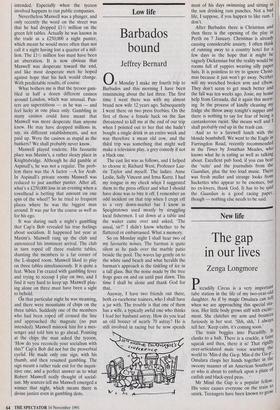New life
The gap in our lives
Zenga Longmore
Piccadilly Circus is a very important tube station in the life of my two-year-old daughter. As if by magic Omalara can tell when we are approaching this special sta- tion. Her little body grows stiff with excite- ment. She clutches my arm and bounces furiously in her seat. `Shh, shh,' I always tell her. 'Keep calm, it's coming soon.' The train boggles into Piccadilly. It clunks to a halt. There is a crackle, a faint squeak and then, there it is! That rigidly over-articulated male voice warning the world to `Min-d the Ga-p. Min-d the Ga-P . Omalara clasps her hands together in the swoony manner of an American Southern- er who is about to embark upon a plate of catfish and black-eyed peas. , Mr Mind the Gap is a popular fellow- His voice causes everyone on the train to smirk. Teenagers have been known to grow
• quite hysterical when trying to imitate him. I can never hear that stern, 1940s voice without recalling the innocence and beauty of a bygone time. Yes, that announcement was certainly an all-round family favourite.
Now picture, if you will, this poignant scene: our train had just pulled out of Oxford Circus. Omalara was bobbing up and down in her seat, impatiently practic- ing her Mind the Gaps. We reached Pic- cadilly and fell silent in reverence-for The Voice which was surely about to come. There was the familiar crackle, a blipping sound and — no Mr Mind the Gap! Instead a chipper female voice came over the tannoy, the type of voice you expect to hear when phoning your local poll tax office. Perky, but ruthless, if you know what I mean.
'Mind the gap, please,' she said, with a hardness which suggested that secretly she did not care whether we minded the gap or fell under the train. Mr Mind the Gap had sounded sincere. He was obviously anxious for our welfare. We had felt secure, pro- tected and just a touch amused by the con- cern expressed in his voice. And now that voice was no more.
Omalara and I looked at one another in wordless horror. I felt the squeeze of her hand on mine. 'What will it be next?' we were thinking. First the pound note, then the red phone boxes, and now Mr Mind the Gap. Everything English that we most love has to be abolished. I even heard that Beefeaters are on their way out, but I trust there is no truth in the rumour. After all, what would become of us all if those ravens were to starve to death?
I suppose there has never been a time when the parts of our lives that we love the most have not been abolished. The Druids were probably just as annoyed when the Romans abolished their priesthood as I was when Mr Mind the Gap breathed his last. It just seems a pity that as the instinct to abolish grows ever stronger in mankind, the instinct to create grows weaker. At least, that is the theory I tried out on my good friend Clawhammer Jones Bingo, club bouncer, philosopher and bush tea vendor.
'I say that both instincts are the same,' he commented sagely. 'Abolishing things must be creative — mankind must tink of ever more ting to abolish, both good and bad. It is a science, and its name is Circles. First they abolish slavery, then they go one step further and abolish freedom. When every- thing has been abolished, they'll start again, re-invent the wheel and call it Progress. Some abolishing is quite 'good, though. Remember the bad old days when the council sent a rent man door to door every week? Now the rent man's gone, no one pays any more, especially if them is high up on the council.'
'Well you couldn't get higher up than me. I'm on the tenth floor and still the bounders expect me to pay rent! They ought to be abolished!'











































































 Previous page
Previous page